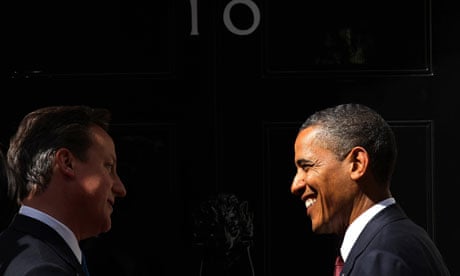It's the war, stupid. At the time of his election in 2009, everything about Barack Obama endeared him to British opinion. Events since have honoured that enthusiasm, with the president retaining an approval rating in the region of 70%. Obama is admired for his vigorous steps to fend off recession. He is admired for confronting the health industry lobbyists. He speaks the language of conciliation abroad. He has seemed a voice of reason and sobriety, after eight years under George Bush when America seemed alien and painfully at odds with the world.
This has been spoiled by continuing western military aggression in and on Muslim states. All Obama promised, in cleansing the west's reputation, in restoring disengagement and reversing Washington's image as an overbearing bully, has been vitiated by surges, drone missiles and the kneejerk attack on Libya. That the top item at a summit between Britain and America should be how to bomb a north African state that threatens neither of them is absurd. To many in Britain, American foreign policy under Obama has come to seem Bush-lite, while Britain's seems Blair-lite.
This is more than sad. In Obama and David Cameron the west has two of its most capable and convincing leaders in a quarter century. Both are thoughtful men, albeit inexperienced in foreign affairs, with relatively secure home bases. These leaders should be ideally cast as beacons of sane judgment in parts of the world that chronically need it.
So why are both trapped in the morass of the Muslim arc, sitting targets for the jibes of Islamist fundamentalists? For the first time since the fall of the Berlin Wall, nations forming a significant regional grouping have seemed on the brink of freeing themselves from oppressive regimes. They are doing so not through outside intervention or military coup but through the delicate process of insurrection. They have mobilised their capitals and provincial cities, their professions, their military, their urban middle class and those eternal agents of change, students. They have demanded great sacrifice and loyalty from their peoples to the cause of freedom. But their cause has derived its peculiar potency through being "bottom-up".
Such regime change may be aided by outside support, from the media, overseas contacts and an expatriate diaspora. It is not aided by grandstanding in Washington and London, by megaphone diplomacy and by blundering military intervention. There is no evidence that it is helped by aerial bombardment, which strengthens rather than weakens the resistance of the bombed. Nor is insurrection aided by tipping money into dissident factions, which become corrupted and dependent on such support, as appears to have happened in Iran.
Such intervention played no part in the decay of communism. It toppled regimes in Afghanistan and Iraq by main force, but at vast cost and with so much damage to the physical and political fabric that stable reconstruction has been impossible. Military intervention played no part in regime change in Tunisia and Egypt, while its deployment in Libya seems to have been counter-productive. There was desperation in Monday night's display of air power over Tripoli, as the RAF celebrated Obama's arrival in Britain with a reprise of Bush's 2003 "shock and awe" in Baghdad. This is not responsible foreign policy, but rather an archaic brutalism.
That the Anglo-American special relationship, coyly renamed "essential", should take the form of military aggression is a missed opportunity. Yesterday's article by Obama and Cameron in the Times was a museum piece of platitude and cliche, interspersed with such whoppers as the claim that, in responding to the Arab spring, "it is not our place to dictate the pace and scope of this change". Why then are they trying to dictate it in Libya?
Obama's private distaste for the legacy of Bush is clear. He is trying to move the American war machine out of Iraq and hopes that the "surge" in Afghanistan can in time cover a retreat there as well. This makes it the more disappointing that he cannot rein in the military machine now entrenching America's presence across the Muslim world.
Recent revelations in the New York Times by the widow of the late American envoy, Richard Holbrooke, indicate deep scepticism among diplomats in Afghanistan and Pakistan towards Obama's continued belligerence, and towards his reliance on assassination and drone attacks. Holbrooke depicts an unsure Obama in awe of his generals and reluctant to hear warnings that he faces another Vietnam. There seems little hope that the president might redirect his attention at negotiation, let alone accept that "a stable Afghanistan is not essential: a stable Pakistan is".
Most western democracies are struggling to retrieve their economies from the credit crunch. Only America and, to a lesser extent, Britain still regard it as their manifest, and costly, destiny to dictate the manner in which a selection of world states rule their people. This "neoconservative" ambition might not be so ignoble were it implemented effectively, were it deputed to soft-power agencies in education, health, international exchange and the promotion of trade. Such methods were being tried, until recently, in both Libya and Syria. That they did not work out in the short term did not make them wrong.
What is surely exhausted is the policy that Britain and America currently share, of bringing about regime change by military aggression. Generals can promise politicians glory, even if they seldom deliver it. But they are bulls in the interventionist china shop.
Obama and Cameron have let themselves become trapped in a lethal military embrace, one that has failed to deliver peace in Iraq or security in Afghanistan. It has destabilised Pakistan and spread al-Qaida's influence. It has killed hundreds of thousands of people to no one's obvious benefit, and cost billions of dollars that would have been better deployed on peace and reconstruction. Today, London and Washington are fortress cities through which their statesmen must travel like frightened rabbits, like Obama during his London visit.
This was the legacy of Bush and Blair and it is the most barren in recent history. Yet it holds those successors in thrall. Neither has shown a capacity to disengage from the drums and trumpets of warin favour of a more subtle and more productive diplomacy. Until they do, any hope that the west's leadership might gain traction in the Muslim world is futile.
simon.jenkins@theguardian.com









